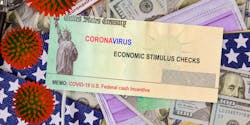Biden Signs New $1.9 Trillion COVID-19 Stimulus Package
Biden signed his $1.9 trillion COVID-19 relief bill into law March 11 after it passed both houses of Congress on razor-thin party lines. It contains federal funds for individual stimulus payments, an extension of expanded unemployment benefits through September, and money for state governments, schools, restaurants and other businesses.
Before the bill extended them, extended federal unemployment benefits were set to expire over the weekend.
Direct support for businesses in the bill is included in $28.6 billion for restaurants and bars hurt by the pandemic and $7.25 billion more in funds for the Payroll Protection Program. It also allocates $10 billion for Biden to use for directing companies to manufacture critical medical supplies like personal protective equipment and other medical devices.
The bill did not, however, contain a provision to raise the federal minimum wage to $15 an hour over several years. Earlier versions included the provision, but a Senate Parliamentarian ruled that including the measure would require the bill to pass in the upper chamber by 60 votes instead of a simple majority. Democrats elected to drop the wage increase in order to pass it in a 50-49 vote.
In statements given at the White House, President Biden said the bill would deliver “immediate relief” to millions of people and help small businesses.
“I believe this historic legislation is about rebuilding the backbone of this country,” said Biden, and giving “working people and middle-class folks” a “fighting chance.”
Senator Ron Johnson, who resisted allowing the bill to pass quickly in the Senate, said on Twitter that the bill was “not a COVID relief bill. It’s a boondoggle for Democrats.”
Republican critics of the measure said the bill was too expensive, skewed towards liberal policies like expanding coverage of the Affordable Care Act, and unnecessary considering signs of increasing economic revival. The overall economy added 379,000 jobs in February.
About the Author
IW Staff
Find contact information for the IndustryWeek staff: Contact IndustryWeek
